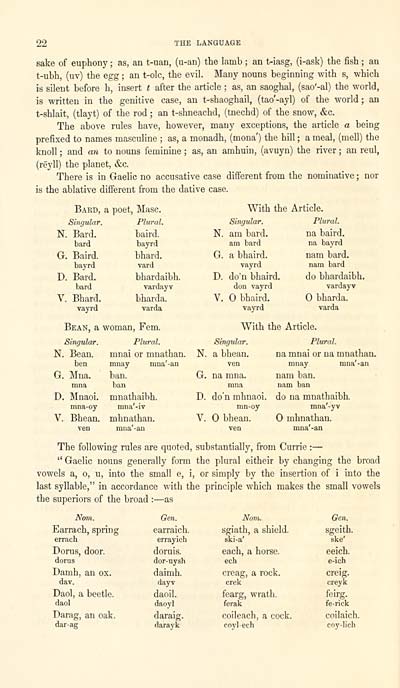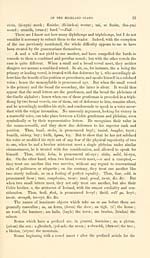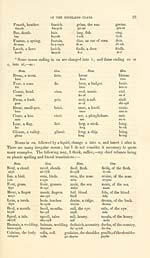Download files
Complete book:
Individual page:
Thumbnail gallery: Grid view | List view

22
THE LANGUAGE
sake of euphony ; as, an t-uan, (u-an) the Iamb ; an t-iasg, (i-ask) the fish ; an
t-ubh, (uv) the egg ; an t-olc, the evil. Many nouns beginning with s, which
is silent before h, insert t after the article ; as, an saoghal, (sao'-al) the world,
is written in the genitive case, an t-shaoghail, (tao'-ayl) of the world ; an
t-shlait, (tlayt) of the rod ; an t-shneachd, (tnechd) of the snow, &c.
The above rules have, however, many exceptions, the article a being
prefixed to names masculine ; as, a monadh, (mona') the hill ; a meal, (mell) the
knoll ; and an to nouns feminme ; as, an amhuin, (avuyn) the river ; an reul,
(reyll) the planet, &c.
There is in Gaelic no accusative case different from the nominative ; nor
is the ablative different from the dative case.
Baed, a poet, Masc.
With the Article.
The following rules are quoted, substantially, from Currie : —
" Gaelic nouns generally form the plural eitheir by changing the broad
vowels a, o, u, into the small e, i, or simply by the insertion of i into the
last syllable," in accordance with the principle which makes the small vowels
the superiors of the broad : — as
THE LANGUAGE
sake of euphony ; as, an t-uan, (u-an) the Iamb ; an t-iasg, (i-ask) the fish ; an
t-ubh, (uv) the egg ; an t-olc, the evil. Many nouns beginning with s, which
is silent before h, insert t after the article ; as, an saoghal, (sao'-al) the world,
is written in the genitive case, an t-shaoghail, (tao'-ayl) of the world ; an
t-shlait, (tlayt) of the rod ; an t-shneachd, (tnechd) of the snow, &c.
The above rules have, however, many exceptions, the article a being
prefixed to names masculine ; as, a monadh, (mona') the hill ; a meal, (mell) the
knoll ; and an to nouns feminme ; as, an amhuin, (avuyn) the river ; an reul,
(reyll) the planet, &c.
There is in Gaelic no accusative case different from the nominative ; nor
is the ablative different from the dative case.
Baed, a poet, Masc.
With the Article.
The following rules are quoted, substantially, from Currie : —
" Gaelic nouns generally form the plural eitheir by changing the broad
vowels a, o, u, into the small e, i, or simply by the insertion of i into the
last syllable," in accordance with the principle which makes the small vowels
the superiors of the broad : — as
Set display mode to: Large image | Transcription
Images and transcriptions on this page, including medium image downloads, may be used under the Creative Commons Attribution 4.0 International Licence unless otherwise stated. ![]()
| Early Gaelic Book Collections > Blair Collection > Treatise on the language, poetry, and music of the Highland clans > (34) |
|---|
| Permanent URL | https://digital.nls.uk/76236777 |
|---|
| Description | A selection of books from a collection of more than 500 titles, mostly on religious and literary topics. Also includes some material dealing with other Celtic languages and societies. Collection created towards the end of the 19th century by Lady Evelyn Stewart Murray. |
|---|
| Description | Selected items from five 'Special and Named Printed Collections'. Includes books in Gaelic and other Celtic languages, works about the Gaels, their languages, literature, culture and history. |
|---|

